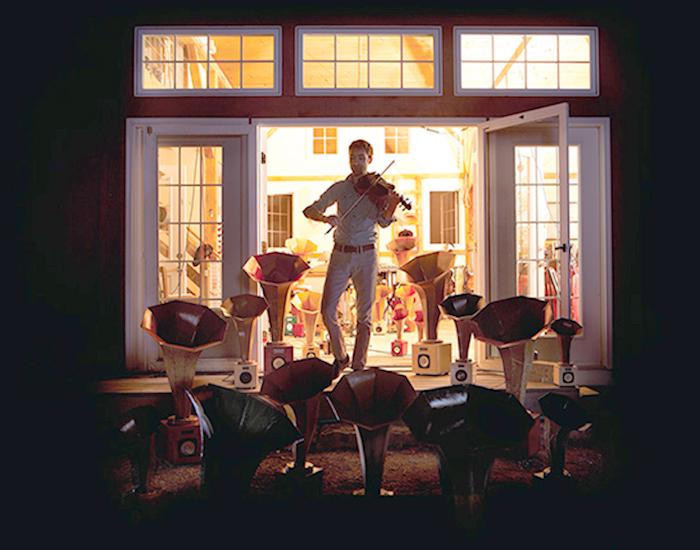Release Date: October 30, 2012
Rating: 3.5 / 5
At first glance, it’s easy to write off Andrew Bird’s newest release, Hands of Glory. Relative to the rest of his output, it is short both in terms of songs (8) and running time (35 minutes). It consists of covers of classic country songs, alternate versions of songs off of Bird’s earlier (very solid) 2012 album Break It Yourself, and a few originals. It’s been marketed as a companion / outtakes EP to Break It Yourself. Most of all, it’s all built around a recording gimmick: the whole album – instruments, vocals, and all – was recorded with Bird and company gathered around a single microphone.
Whether it’s because of or in spite of all that, Hands of Glory deserves more than your first glance. While gimmicky, the single-take, single-microphone recording technique highlights Bird’s desire to continue refining and changing his sound. Gone are the intricate, overlapping violin loops of his earlier work; that kind of song isn’t even possible with the type of equipment on which Hands of Glory was recorded.
In the tradition of the country(ish) direction Bird seems to be taking with Hands of Glory, he spends most of the time with his fiddle. Break It Yourself was about carefully arranged pop songs full of violin and acoustic guitar; structures, and melodies changed within songs, sometimes several times, but the album sounded effortless and cohesive.
This is because, to be blunt, Hands of Glory contains much simpler music. The staccato bass line, strummed acoustic guitar, and singing saw of the opening track “Three White Horses” set the tone and style for the rest of the album. In some ways, it’s the most musically ambitious track of them all.
“When That Helicopter Comes” is a cover of a song by the modern alt-country band The Handsome Family. The bass plucks along, guitars strum, the singing saw sounds menacing. It’s a darker and ominous track than anything off of Break It Yourself and the rest of Hands of Glory.
The next song “Spirograph” would have been right at home on Break It Yourself. It starts off with careful guitar plucking, and then picks up to lively strumming and singing saw background noise for the chorus.
Next up is “Railroad Bill,” another cover. This is a classic country tune, but Bird sounds just at home playing fiddle with a lively country bounce as he did covering the dark alt-country of “When That Helicopter Comes.” This is certainly one of Andrew Bird’s strengths, but something of a drawback for Hands of Glory. Although a great version of a classic country song, “Railroad Bill” sounds slightly out of place in the middle of the album.
On the heels of “Railroad Bill” is “Something Biblical,” another track which sounds like an outtake from Break It Yourself. At four and a half minutes, it’s the second-longest song on the album, and its slower tempo is a little jarring after the up-tempo bounce of “Railroad Bill.”
“If I Needed You” is back to a slower country swing. “Orpheo” is a stripped down version of “Orpheo Looks Back” from Break It Yourself, and is both interesting in that context and a fine song on its own terms.
The album closes with the nine-minute “Beyond the Valley of the Three White Horses,” a slow developing song that builds for a while and then slowly fades. It is the sound of a relaxed Andrew Bird, playing music however he wants.
Although it sounds like a tautology, one of Andrew Bird’s greatest strengths is that an Andrew Bird album always sounds just like an Andrew Bird album. He doesn’t work with big name producers who have a signature sound, and he isn’t signed to a major label; he releases albums frequently, but this is clearly due to his own ubiquity and not any outside pressure. Even as he continues to refine and change his sound with Break It Yourself and now the alt-country direction of Hands of Glory, his music sounds like it is the exact type of music he wants to be making at this point.
In the end, Hands of Glory falls short of Break It Yourself. It’s not as cohesive, not as carefully crafted, and feels a little disjointed. That said, Andrew Bird is a professional musician (in the best sense of the term) and an EP of his covers, outtakes, and alternate versions is better than plenty of other people’s best music. Hands of Glory is worth your time, both as a document of Andrew Bird’s continuing development as an artist and of its own merits as supremely competent and enjoyable piece of listening.


